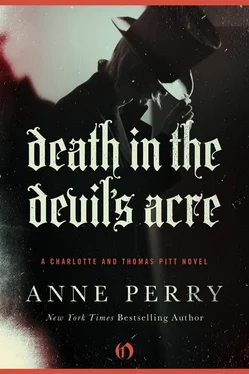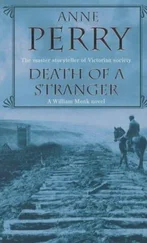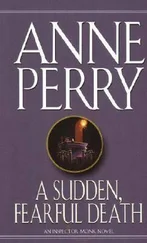Anne Perry - Death in the Devil's Acre
Здесь есть возможность читать онлайн «Anne Perry - Death in the Devil's Acre» весь текст электронной книги совершенно бесплатно (целиком полную версию без сокращений). В некоторых случаях можно слушать аудио, скачать через торрент в формате fb2 и присутствует краткое содержание. Жанр: Исторический детектив, на английском языке. Описание произведения, (предисловие) а так же отзывы посетителей доступны на портале библиотеки ЛибКат.
- Название:Death in the Devil's Acre
- Автор:
- Жанр:
- Год:неизвестен
- ISBN:нет данных
- Рейтинг книги:4 / 5. Голосов: 1
-
Избранное:Добавить в избранное
- Отзывы:
-
Ваша оценка:
- 80
- 1
- 2
- 3
- 4
- 5
Death in the Devil's Acre: краткое содержание, описание и аннотация
Предлагаем к чтению аннотацию, описание, краткое содержание или предисловие (зависит от того, что написал сам автор книги «Death in the Devil's Acre»). Если вы не нашли необходимую информацию о книге — напишите в комментариях, мы постараемся отыскать её.
Death in the Devil's Acre — читать онлайн бесплатно полную книгу (весь текст) целиком
Ниже представлен текст книги, разбитый по страницам. Система сохранения места последней прочитанной страницы, позволяет с удобством читать онлайн бесплатно книгу «Death in the Devil's Acre», без необходимости каждый раз заново искать на чём Вы остановились. Поставьте закладку, и сможете в любой момент перейти на страницу, на которой закончили чтение.
Интервал:
Закладка:
The suggestion that he was illiterate was the final straw.
“I am acquainted with General Balantyne,” Pitt snapped. “And it is police business. If you prefer to discuss it on the doorstep, I shall oblige you. But I imagine the general would rather have it pursued inside! Considerably more discreet-don’t you think?”
The footman was startled, and he allowed it to show. To have police at the house-and at the front of it-was appalling. Damn the man’s impertinence! He composed his face, but was annoyed that Pitt was taller than he by some inches, so even with the advantage of the step he could not adequately look down on him.
“If you have some problem of theft or the like,” he replied, “you had better go round to the tradesmen’s entrance. No doubt the butler will see you-if it is really necessary.”
“It is not a matter of theft,” Pitt said icily. “It is a matter of murder, and it is General Balantyne I require to speak to, not the butler. I cannot imagine he will be best pleased if you oblige me to come back with a warrant!”
The footman knew when he was beaten. He retreated. “If you will come this way.” He refused to add the “sir.” “Perhaps if you wait in the morning room, the general will see you when he is able.” He walked smartly across the hall and opened the door of a large room whose grate held the embers of a fire that took the chill from the air but was not hot enough to thaw Pitt’s hands or warm his body through his clothes.
The footman looked at the ashes and smirked with satisfaction. He turned and went out, closing the polished wooden door with a click. He had not offered to take Pitt’s hat or coat. Five minutes later, he was back, his face pinched with anger. He took Pitt’s outer clothes and ordered him to follow the parlormaid to the library.
In that room a fire was blazing, reflecting bright scarlet in the leather bindings of books and glinting off the polished trophies on the far wall, The general stood behind a great desk littered with inkstands, pens, paperweights, open books, and a miniature field cannon in brass-a perfect replica of a Crimean gun. He had not changed outwardly since Pitt saw him last: the same broad, stiff shoulders, the proud face, the light brown hair perhaps graying a little, although Pitt was not sure. It was a face dominated by strength of bone, and the coloring was incidental.
“Well, Mr. Pitt?” he said formally. He was a man who did not know how to be casual. All his life had been spent observing rules, even in the face of terror or extremity of pain. As a boy soldier, he had stood appalled on the ridge above Balaclava and seen the charge of the Light Brigade. The carnage of the Crimea was indelible in his memory. He knew the men of the “thin red line” who had held against all the might hurled at them by the Russian Army, men who had kept their ground in face of the impossible. Hundreds had fallen, but not a man had broken ranks.
“My footman says you wish to speak to me about a murder? Is that correct?”
Pitt found himself standing a little straighter-not quite to attention, but definitely with his feet together and his head up. “Yes, sir. A week ago there was an extremely unpleasant murder in an area known as the Devil’s Acre, hard by Westminster.”
“I know where it is.” The general frowned. “But surely that was this morning?”
“I’m afraid there was a second one this morning. The first did not make much of a mark in the newspapers. However, I was called in for this one today, and when I heard of the earlier one, naturally I went to see the body.”
“Naturally,” the general’s frown deepened. “What is it you wish of me?”
Now that it came to the point, Pitt felt rather embarrassed at having to ask this man to come and look at the corpse of a dead procurer of whores. What did it matter if it was or was not the man who had been his footman at the time of the Callander Square murders? It could make no real difference now.
He cleared his throat; there was no avoiding it. “I think the man may be someone you knew.”
The general’s eyebrows rose in amazement. “Someone I knew?”
“Yes, sir, I think so.” Pitt explained as briefly as he could the circumstances of Pinchin’s death, and what Inspector Parkins had shown him at the mortuary.
“Very well,” the general said reluctantly, and reached for the bell cord to summon the carriage.
The door opened and, instead of the footman, one of the most striking women Pitt could recall ever having set eyes on came in: Lady Augusta Balantyne. Her face was as fine as bone china, but without any of porcelain’s fragility. Her clothes were magnificent, in the subdued taste of those who have always had money and therefore never felt the compulsion to display it garishly. She stared at Pitt with distaste; her very posture appeared to demand an explanation, not only for his presence in her house but for his very existence.
Pitt refused to be intimidated. “Good afternoon, Lady Augusta,” he said with a slight bow. “I hope I find you well?”
“I am always well, thank you, Mr.-” She could not have forgotten their past meetings; the subject was too bizarre, too painful. “Mr. Pitt.” She arched her eyebrows very slightly, and her eyes were glacial beneath them. “To what unfortunate occurrence do we owe your visit this time?”
“A matter of identification, ma’am,” he answered smoothly. He felt the general relax, even though he could barely see him at the edge of his vision. “A man General Balantyne may be able to name for us, and if so, that might assist us greatly.”
“Good gracious-can the man not name himself?”
“People do not always tell the truth, ma’am,” he said dryly.
She colored at her own clumsiness for not having seen the obvious.
“And in this case I understand he is dead anyway,” the general added tartly. “It is nothing for you to concern yourself with, my dear. It is my duty to be of assistance, if I can. I dare say I shall not be long.”
“Have you forgotten we are dining with Sir Harry and Lady Lisburne tonight?” She ignored Pitt as if he had been one of the servants. “I do not intend to arrive late. I will not be thought ill-mannered, whatever you may imagine your duty to be.”
“The man is in a mortuary not half an hour away.” The general’s face flickered with irritation. He disliked dinner parties, and, with Harry Lisburne as host, this one was likely to be more tedious than ever. “I have only to look at him and say whether I know him or not. I shall be back before dark.”
She blew down her nose with a little sigh, and went out without looking at Pitt again. General Balantyne walked into the hall, collected his coat from the waiting butler, and accompanied Pitt out into the rain just as the coachman drove around from the mews and stopped at the curbside for them.
They rode in silence. Pitt did not want to prejudice the identification by discussing the case beforehand, and he felt no compulsion to make small talk of other things.
The carriage stopped a short distance from the mortuary, and Pitt and the general alighted and walked up the path, still silent. Inside, the duty attendant appeared startled to see a gentleman of Balantyne’s obvious quality, but he recognized Pitt, and conducted them to the body without hesitation.
“There you are, sir.” He whipped back the sheet with the air of a conjurer producing a rabbit.
Like Pitt before him, the general’s eyes went straight to the mutilation, not even glancing at the face. He took a deep breath and let it out. He had seen death before, a great deal of death, almost all of it by the violence of war or the ravages of disease. What made this uniquely appalling to him was that it had happened deliberately, here at home in the streets of London. The inexpert dismemberment was not the accident of random cannonfire, but looked to be the result of a passionate and individual hatred for one man in particular.
Читать дальшеИнтервал:
Закладка:
Похожие книги на «Death in the Devil's Acre»
Представляем Вашему вниманию похожие книги на «Death in the Devil's Acre» списком для выбора. Мы отобрали схожую по названию и смыслу литературу в надежде предоставить читателям больше вариантов отыскать новые, интересные, ещё непрочитанные произведения.
Обсуждение, отзывы о книге «Death in the Devil's Acre» и просто собственные мнения читателей. Оставьте ваши комментарии, напишите, что Вы думаете о произведении, его смысле или главных героях. Укажите что конкретно понравилось, а что нет, и почему Вы так считаете.












